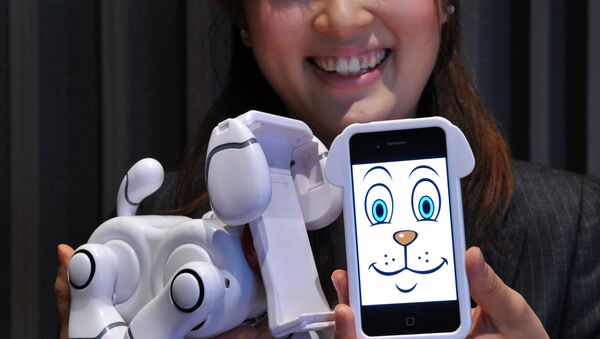Sputnik: Lilian, you believe that connecting children, and leaving them to their own devices leaves them unnecessarily vulnerable to advertisers. How has advertising changed now that kids are online?
Lilian Edwards: Well essentially, the Watershed is dead, because you can get kids anytime. What we've been saying for a really long time is that all the old rules, about how you were allowed to advertise on TV, not pressurizing, not using methods that were bad for kids- they've gone, because you can avoid them all by using the internet.
Lilian Edwards, professor of e-governance at the University of Strathclyde in Glasgow, is a UK academic in the field of Internet law and intellectual property. She is on the Advisory Board of the Open Rights Group and the Foundation for Internet Privacy Research.
Sputnik: Advertising methods now are unrecognizable to what they were 10 years ago, and our engagement with media is now more active than passive- that means new promotion tactics are emerging. Should we really be buying our kids connective toys?
Lilian Edwards: It's just become cool, in the last year it (connective toys) has become one of the hottest toys. But often, it adds very little to the functionality, and what you're doing is your creating this dangerous thing in the kid’s bedroom. Not just that it can be hacked, which is what had made the headline, but also that they're a bug, basically a bug collecting your kids conversations. And, is that something you want? It means that information is going to go into profiles about your kids, which will be used to sell them things. Possibly things you don't want them to be sold. It might mean they're collecting information about their health problems, or their developmental problems.
This is a big thing that people really aren't taking on board.
John Carr is secretary of the UK Children's Charities' Coalition on Internet Safety and a member of the Executive Board of the UK Council for Child Internet Safety.
Sputnik: John you’re saying that it is up to the companies to make their systems secure for child users…
John Carr: I don't have a problem, in principal, with children using toys that are connected to the internet. But what is completely unacceptable is for businesses, who make money out of selling these toys, not to give serious attention to the security of those toys. Take for example, the companies that were selling baby listening devices (baby monitors). Some of these devices were being sold, and it was discovered that there was zero security attachment to them. So, when some parents walked into their babies’ bedroom, they were hearing people who had hacked into the device, using profane and obscene language, talking to their babies in their cots. It's completely unacceptable for businesses to sell devices, which they know are going to be used by children, if those devices have not been given the highest level of security to stop hackers getting into them. And that's where VTech fell down, and that's why they've been fined.
Sputnik: Vtech's poor data security practice lead to a 650,000 dollar fine, which, considering the size of the company, is not that much. But the lawsuit will hopefully lead other toy companies to follow suit, checking and rechecking their data security to make sure children are protected.
John Carr: No device, aimed at children, likely to be used by children or that can connect to the internet, should be allowed to go on sale until it has been officially, properly, and thoroughly certified as being as secure as it possibly can be. You would have thought, of all of the businesses that would take extra care, selling toys, and things aimed at children would be the most careful. It's completely unacceptable.
READ MORE: Internet-Connected Toys Could Let Hackers Access Your Children
Sputnik: The idea that children are being monitored is dystopian, but shockingly, not overly far-fetched. The Simpsons Funzo episode steered all too close to the truth when Lisa gasps: "They're spying on us! Why would they do that?" (cue menacing music)…
John Carr: There was a doll, called the 'Cayla Doll'. The kids talk to them, confide in them, in the way children do, but here's the thing- Those conversations were being picked up and transmitted over the internet to servers, that were owned by the company that owned the toys. Those companies were being hacked, and unknown people were able to listen to what those children were saying. They could then potentially identify the children and as soon as you get into that kind of territory, you're getting into some scary risks and some very, very scary scenarios.
The views expressed in this article by Lilian Edwards and John Carr are solely those of the experts and do not necessarily reflect the official position of Sputnik.



